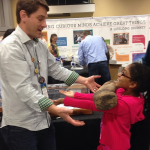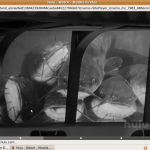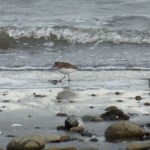Citizen science
Computers, biological data (molecular sequences, structures, and other data), websites, and databases are integral to modern research. Innovations like precision, or personalized medicine, expect a certain level of patient participation, and our future food and environmental sustainability will require that society can access a multitude of computer-based resources. Thus, higher education has an important role in providing students with employable skills as well as the ability to use data to make important personal and societal decisions. Toward that goal it is worthwhile understanding…
Guest Blog By X-STEM Speaker Aaron A. Alford, PhD, MPH, PMP
Hands-on learning and human connections are essential to STEM education. Without exception, all of the scientists that I know were inspired to enter STEM career tracks by someone who helped them make an emotional connection to science and discovery.
As a scientist and an educator, I was absolutely thrilled to be a part of the X-STEM Extreme STEM Symposium and the USA Science & Engineering Festival in Washington, D.C. at the end of April. Both events provided a grand opportunity to interact with students and learners of all types…
Renowned publication Scientific American is returning to the Festival as a key Media Sponsor, ready to wow students, teachers and the public with a wide assortment of activities based on content from the magazine as well as other divisions of its parent company, Macmillan Science & Education.
Under the theme, ¨Helping Curious Minds Achieve Great Things," Scientific American's exhibit is set to inspire visitors across a broad spectrum, from K-12 learners and teachers to college students to the general science enthusiast. The activities are designed to inspire a…
There are few different, related, ways in which climate change, including anthropogenic global warming, can cause extreme weather events. One is that climate zones move. This may result in "normal" weather for a different location occurring elsewhere. For example, if southern warm air system shift north, than the frequency of low and high temperatures, and their distribution throughout the year, can change. Another is the rise of entirely new conditions that were previously either rare or virtually unknown. One example of this might be the steering of Hurricane Sandy into the northeastern…
"If it's true that our species is alone in the universe, then I'd have to say the universe aimed rather low and settled for very little." -George Carlin
Whatever you may think of the chances are for intelligent life in our galaxy are today, I can guarantee you they're going to go up dramatically in a few billion years. Sure, by that time the Earth may be a little too hot for comfort, and in that sense -- as Split Lip Rayfield would say -- we'll probably
Never Make It Home.
But that doesn't mean there won't be a new-and-improved home out there, not only from among the stars and planets in our…
Now this is just cruel: yesterday the Cambridge Science Festival kicked off - a week of science, sciart, sci-journalism and sci-education activities at MIT, Harvard, the Museum of Science, and surrounds. Am I going to be hanging out all day with my fellow-geeks in the sun (which finally came out a few days ago, right on cue)? No! Because I have to write two final papers. (At least they're about sci-law. . . )
Anyway, don't be like me. If you're in the Cambridge/Boston area, have a life and check out the Cambridge Science Festival schedule. There are talks, performances, screenings, panels,…
Christopher Reiger has a great post at Hungry Hyaena about public communication strategies used by scientific advocacy groups, and where artists should adopt similar strategies:
Most Americans see science as extraneous esoterica crafted by white-coated wonks. Similarly, contemporary art is seen as the province of effete Onanists devoid of "family values." But the respective responses of the two realms to these ugly public perceptions is critically different. The scientific community has confronted the issue head-on, spilling ink, hosting panel discussions, and building programs. Whether or…
For everyone frustrated with the unscientific, spotty, incoherent and often inaccurate coverage of the Japanese nuclear plant situation: one geo-blogger and her dad try to help out. Now THAT is how you use your scientific expertise to improve public understanding in a meaningful, immediate way. Bravo, georneys!
An invitation from scienceforcitizens.net:
As record levels of snow blanket much of the United States this year, Science For Citizens is collaborating with an important climate research project at the University of Waterloo called Snow Tweets. We're pleased that this is the first of many scientific projects that you'll be able to do on Science for Citizens.
To help researchers track climate change, we're requesting that you find a ruler, put on a warm coat, go outside, and measure the depth of snow wherever you happen to be. And then report the depth to us right here. That's all there is to…
The normally sensible Bart went slightly gooey over Citizen Science recently, although to be fair he linked to his earlier article wherein he was distinctly more dubious about the benefits, and indeed about the good intentions about some of the wannabe scientists. And in the comments he is more equivocal.
Then by coincidence I ran across Astronomers thankful for return of Jupiter's belt where Phil Plait again lauds the amateur:
Astronomy is an awesome science: it's one of the few where dedicated "hobbyists" can contribute, and do so in a critical and timely way. It's a big sky, with a lot to…
Is there a place for citizen scientists in the world of digital biology?
Many of the citizen science projects that I've been reading about have a common structure. There's a University lab at the top, outreach educators in the middle, and a group of citizens out in the field collecting data.
After the data are collected, they end up in a database somewhere and the University researchers analyze them and write papers. At least that's my impression so far.
It seems to me, that with all kinds of databases out there, on-line, there should be plenty of opportunity for both citizens and student…
A common theme I hear in talks on personalized medicine, is that increased access to genomic data and medical literature are changing the relationship between doctors and patients. Patients are through being passive recipients of paternalistic health care. They are demanding to participate and be treated as partners with health care providers.
Citizen science can serve a similar role.
Just as personalized medicine is starting to make it possible for individuals to monitor and participate in their own personal health, citizen science is making it possible for people to participate and…
On Saturday afternoon, at ScienceOnline2010, the science goddess, the chemspider, and I (Sandra Porter) will be presenting a workshop on getting students involved in citizen science.
In preparation, I'm compiling a set of links to projects that involve students in citizen science. If you know of any good citizen science efforts, please share them here in the comments. And, you want to see a really interesting set of projects, be sure to check out the comment section on the original post.
Here we go!
Before I start listing links, I am limiting my list to projects that allow both students and…
Do citizen science efforts ever go beyond "feel good" contributions? Do the data get published in peer-reviewed journals?
In an earlier post, I started a list of citizen science projects that allow students to make a contribution. Many commentors are graciously adding to that list and I thank you all! I'm glad to learn there are so many interesting projects and ways for people to get involved. Science is so empowering!
My question today concerns things like outcomes and deliverables. We'd like to assume that good things are coming from citizen science because people are involved, but I…
Next Saturday afternoon, at ScienceOnline2010, the science goddess, the chemspider, and I will be presenting a workshop on getting students involved in citizen science.
In preparation, I'm compiling a set of links to projects that involve students in citizen science. If you know of any good citizen science efforts, please share them in the comments.
Here we go!
Before I start listing links, I am limiting this list to projects that allow both students and citizen scientists to participate. I know of plenty of student projects, where students can isolate phage and annotate their genomes or…
If you're in Seattle, Dr. Bruce Alberts will be talking tomorrow night (Jan 5th) at the Seattle Aquarium on science education and the role that scientists play.
There are also some really interesting talks at a day-long workshop, Wednesday (Jan 6th) at the UW South Campus Center.
The details and registration info are below:
~ ~ ~ ~ ~ ~ ~ ~ ~ ~ ~ ~ ~ ~ ~ ~ ~ ~ ~ ~ ~ ~ ~ ~ ~ ~ ~ ~ ~ ~ ~ ~ ~ ~ ~ ~ ~ ~ ~ ~ ~ ~ ~ ~ ~
Tuesday:
COSEE Ocean Learning Communities & Washington SeaGrant Present
Redefining Science Education and the
Roles that Scientists Play in Society
Dr. Bruce Alberts
Tuesday,…
We always see interesting creatures whenever we walk on the beach. Now, a new program from the University of Washington and the state department of Fish and Wildlife is seeking to enlist beach walkers in a community science project where they can help monitor biodiversity.
The program is called NatureMapping and it's mission is to enlist the community and schools in monitoring the health of our beaches and contributing data to a state-managed biodiversity database. If you can get to a beach, you can help survey invertebrate species and intertidal marine fish.
Two free facilitator…
There aren't many reports of 14 year-olds making scientific contributions. Even in the field of astronomy, Caroline Moore, the youngest person to discover a supernova, is a bit unusual.
This supernova comes from Astronomy Picture of the day. Photo credits: High-Z Supernova Search Team, HST, NASA
HT: National Science Foundation
The National Science Foundation reported that Moore has found an supernova candidate that may be as unusual as she is.
"It's really a strange supernova," said Moore. "A supernova is a huge explosion deep in the core of a star, whereas a nova is an explosion on the…
A few days ago I had a brief post on a team of Spanish kids who used a latex balloon and a $60 camera to take photographs of the earth from near the edge of space. My info was sketchy at the time, but an alert reader found and sent me a link to the group's website, which has a nice account, with many photos, of the operation. The page is in Catalan but has a pull-down Google translation option up near the top so you can quickly have it translated. It's a great look at the intense excitement of shoestring-budget science.
Here's the crew:
the trajectory of the balloon:
And along the way,…
The stratosphere, as photographed by a group of four Spanish schoolboys, or their balloon, anyway.
Well, okay, maybe it's citizen space photography instead of citizen science. But still. Gotta love this. From the Telegraph:
Proving that you don't need Google's billions or the BBC weather centre's resources, the four Spanish students managed to send a camera-operated weather balloon into the stratosphere.
Taking atmospheric readings and photographs 20 miles above the ground, the Meteotek team of IES La Bisbal school in Catalonia completed their incredible experiment at the end of February…


